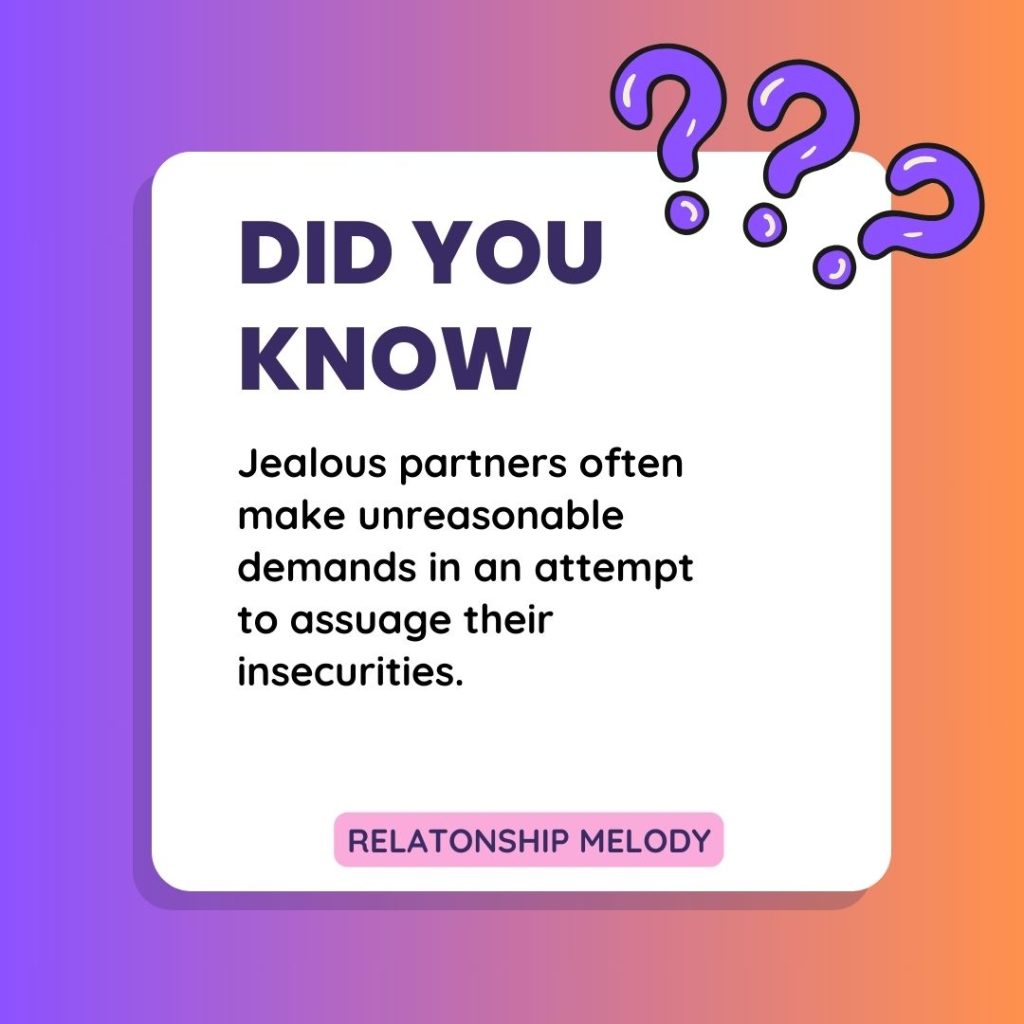25 Signs He Is Too Jealous
Jealousy can be a normal and even healthy emotion in relationships, to some extent. It shows that we care about our partners and want to protect what we have. However, when jealousy becomes excessive and controlling, it can turn toxic and detrimental to the relationship.
In this blog post, we’ll explore 25 signs that indicate your partner may be too jealous, and how it can negatively impact your relationship.
25 Signs He Is Too Jealous
Here are 25 signs to know.
#1 Constant Accusations:
A partner who is too jealous tends to consistently accuse you of being unfaithful, even without any valid reasons.
Their lack of trust in you leads them to constantly question your fidelity and creates an atmosphere of suspicion within the relationship. This behaviour can be emotionally draining and erode the foundation of trust.
#2 Excessive Monitoring:
Excessive monitoring is a clear sign of an overly jealous partner. They insist on knowing every detail of your life, constantly checking your phone, emails, or social media accounts. This invasion of privacy demonstrates their need for control and their deep-seated insecurities.
#3 Isolation:
Jealous partners often try to isolate you from your friends and family. They fear that others may influence them negatively or pose a threat to their control over them. By isolating you, they gain more power and make it harder for you to seek support or perspective outside the relationship.
#4 Overprotectiveness:
An overly jealous partner becomes excessively possessive and overly protective. They constantly question your interactions with others, often interpreting harmless interactions as potential threats.
Their need to control their social interactions can suffocate their independence and prevent them from forming healthy relationships.
#5 Insecurity:
Excessive jealousy is often rooted in deep-seated insecurity. Your partner’s constant need for reassurance and validation stems from their feelings of inadequacy and fear of being replaced. Their insecurity can manifest as clinginess or a constant need for attention and affirmation.
#6 Irrational Jealousy:
An overly jealous partner tends to become jealous even in situations where there is no apparent reason for it. They jump to conclusions and assume the worst in every situation, often creating unnecessary conflicts and tension in the relationship.
#7 Controlling Behavior:
Jealousy often leads to controlling behaviour. Your partner may impose strict rules on your behaviour, dictating who you can talk to, where you can go, and what you can wear. This control is a manifestation of their insecurities and the need to maintain dominance over you.
#8 Extreme Jealousy Over Success:
Jealousy is not limited to romantic situations. A jealous partner may also exhibit jealousy over your achievements and success in other areas of life. They may feel threatened by your accomplishments and attempt to undermine your confidence or belittle your achievements.
#9 Physical or Verbal Abuse:
In the most extreme cases, excessive jealousy can escalate to physical or verbal abuse. Jealousy-driven aggression poses serious risks to your physical and emotional well-being, and it is crucial to seek immediate help and support if you find yourself in such a situation.
#10 Dismissing your Concerns:
When you express your concerns about their jealousy, they may downplay your feelings or dismiss them as unfounded. They may make you feel guilty for questioning their behaviour, further manipulating the power dynamics within the relationship.
#11 Passive Aggression:
An overly jealous partner may resort to passive-aggressive behaviour when they feel jealous. They may give you silent treatment, withdraw affection, or make snide remarks to punish you for triggering their jealousy.
#12Unreasonable Demands:
Jealous partners often make unreasonable demands in an attempt to assuage their insecurities. They may expect you to change your appearance, limit your social interactions, or give up activities you enjoy to avoid triggering their jealousy. These demands are controlling and can compromise your sense of self.

#13 Constant Comparison:
A jealous partner frequently compares themselves to others, feeling inferior or threatened by your interactions with them. They may constantly seek reassurance that they are better or more desirable than others, leading to an unhealthy cycle of comparison and self-doubt.
#14 Public Humiliation:
In extreme cases, a jealous partner may resort to shaming or embarrassing you in public. This behaviour aims to exert control and maintain dominance over you by undermining your self-esteem and making you feel humiliated and powerless.
#15 Extreme Possessiveness:
Excessive jealousy often manifests as extreme possessiveness. Your partner may display possessive behaviour such as marking their territory, constantly monitoring your interactions with others, or becoming overly jealous when someone shows even the slightest interest in you.
#16 Monitoring Communication:
An overly jealous partner may insist on being copied on every email or text message you send. This invasion of privacy demonstrates their lack of trust and their need to monitor their interactions with others.
#17 Limiting Independence:
Jealousy can lead to a partner discouraging or even prohibiting you from pursuing personal interests or activities outside of the relationship. They may fear that you will meet someone else or be exposed to situations that could trigger their jealousy.
#18 False Accusations:
A partner overwhelmed by jealousy may resort to making up stories or fabricating evidence to support their unfounded suspicions. They may manipulate situations to make you feel guilty or ashamed, even when you’ve done nothing wrong.
#19 Jealousy Outbursts:
When jealousy takes control, a partner may have frequent outbursts of anger or become emotionally volatile. These emotional episodes can be intimidating, causing you to constantly walk on eggshells to avoid triggering their jealousy.
#20 Toxic Masculinity/Femininity:
Some individuals believe that jealousy is a sign of love or possessiveness. They may enforce traditional gender roles and express their jealousy as a way to exert dominance or control within the relationship, perpetuating toxic masculinity or femininity.
#21 Manipulation Tactics:
An overly jealous partner may resort to manipulation tactics to control your actions and limit your freedom. They may use guilt, emotional manipulation, or threats to make you conform to their expectations and avoid triggering their jealousy.
#22 Gaslighting:
Gaslighting is a manipulative tactic in which a partner distorts your perception of reality. They may deny or trivialize their jealous behaviour, making you question your sanity or experiences. Gaslighting can make it difficult for you to recognize and address the toxic effects of their jealousy.
#23 Intense Monitoring of Social Media:
A jealous partner may obsessively monitor your online activity, constantly scrutinizing your interactions with others and making negative assumptions about your relationships. They may become possessive and territorial even in the digital realm.
#24 Possessive Language:
An overly jealous partner may use possessive terms and language when referring to you, treating you as an object rather than an equal partner. This possessive language reinforces their need for control and dominance within the relationship.
#25 Extreme Jealousy Over Past Relationships:
Your partner may become fixated on your previous relationships, constantly comparing themselves to your exes and feeling threatened by your past experiences. This intense jealousy can create ongoing tension and insecurity within the relationship.
Read more: Signs He Is Too Demanding.
Conclusion:
Excessive jealousy can poison a relationship, eroding trust, and creating a toxic environment. Recognizing these signs is crucial in addressing the issue and seeking help if necessary. Open communication, therapy, and setting healthy boundaries are essential steps toward overcoming jealousy and building a healthier relationship.
Remember, love should be based on trust, respect, and mutual support, not control or possessiveness.
If you or someone you know is experiencing relationship abuse, please seek professional help or contact a helpline specializing in domestic violence. Your emotional and physical well-being should always be a priority in any relationship.
Liked Our Article?
Our Patreon link: https://www.patreon.com/RelationshipMelody

Welcome to Relationship Melody! Our website is dedicated to all things on relationships, dating, and love! We are passionate about helping you navigate the ups and downs of love, and our goal is to provide you with valuable insights and information that will make your journey toward a fulfilling relationship smoother and more enjoyable.







